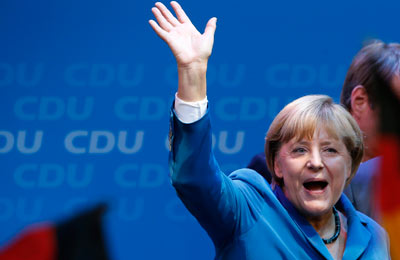
Merkel wins polls but faces tough coalition choices
Berlin, September 23, 2013
Angela Merkel won a landslide personal victory in Germany's general election on Sunday, but her conservatives appeared just short of the votes needed to rule on their own and may have to convince leftist rivals to join a coalition government.
Partial results put support for Merkel's conservative bloc on 42 per cent, their strongest score since 1990, the year of German unification, and a ringing endorsement of her steady leadership during the euro zone crisis.
The outcome left the centre-right chancellor tantalisingly close to an absolute majority in the Bundestag lower house of parliament, a feat achieved only once in 1957 by Konrad Adenauer, the father of the West German federal republic.
"This is a super result," Merkel told cheering supporters. "Together, we will do all we can to make the next four years successful ones for Germany."
If she were to rule alone, which looks unlikely, she would have to do so with a tiny majority, leaving her vulnerable to rebel eurosceptics in her Christian Democratic Union (CDU) and its sister party, the Bavarian Christian Social Union (CSU).
The alternative could be to revive a 'grand coalition' with the centre-left Social Democrats (SPD), who came a distant second with 25.5 per cent, their second worst result in the post-war era. Former finance minister Peer Steinbrueck's gaffe-prone campaign never gained traction against the popular Merkel.
Polls show that the consensus-driven German public would welcome a right-left partnership, as would Berlin's European partners, who hope the SPD might soften Merkel's austerity-focused approach to struggling euro zone members.
But after alienating millions of their own supporters when they partnered Merkel in her first term between 2005 and 2009, the Social Democrats are wary of a sequel.
"We won't automatically go into a grand coalition," said SPD Chairman Sigmar Gabriel. "What is important are the policies."
DOWN TO EARTH
There was bitter disappointment for Merkel's allies in the outgoing government, the market-friendly Free Democrats (FDP), who suffered a humiliating exit from the Bundestag, the first time they will be absent from the chamber in the post-war era.
The Alternative for Germany (AfD), a new eurosceptic party that had threatened to spoil Merkel's victory by breaking into parliament for the first time, appeared to have come up just short of the 5 per cent threshold required to win seats.
The young movement's hostility to euro zone bailouts and call to cut weaker southern members loose from the currency area resonated with many crisis-weary voters and may act as a brake on Merkel's conduct of European policy.
The radical Left party was set to be the third biggest force with about 8.5 per cent, just ahead of the environmentalist Greens, who shed votes to finish near 8 per cent.
Merkel, the daughter of a Protestant pastor who grew up behind the Iron curtain in East Germany, is the third post-war chancellor to win three elections, after Adenauer and her mentor Helmut Kohl.
She is one of the few European leaders to survive the debt crisis, which has seen 19 of her EU peers lose their jobs since the start of 2010.
At CDU headquarters in Berlin, supporters wearing "Angie" t-shirts in the party's orange campaign colours, jumped up and down waving German flags and singing along to the song "Days Like These" by German punk band Die Toten Hosen.
Merkel, whose modest leadership style has given her popularity ratings that other politicians can only dream of, clapped awkwardly to the song.
"People I wouldn't expect to vote CDU did so because of Merkel. Her down-to-earth, honest and calm style convinces German voters," said Johann Schulz-Gebeltzig, a 24-year-old CDU backer.
COALITION PITFALLS
Despite the resounding victory, Merkel's third term won't be a cakewalk.
Were she to try to rule alone, she would have trouble pushing legislation through parliament, especially an upper house dominated by left-leaning parties like the SPD and Greens.
"Given the challenges that lie ahead for Germany, a broader majority would be good for Germany and Europe," said ING economist Carsten Brzeski.
Yet a 'grand coalition' would also have its pitfalls.
Negotiations with the SPD could last months and Merkel might have to cede key cabinet posts, like the finance ministry, and accept SPD policies, such as a minimum wage and higher taxes for top earners, that she has opposed during the campaign.
If the Social Democrats decline to serve under her again, Merkel could turn to the Greens, though such an alliance would likely be even more fraught.
Regardless of what government she ends up with, the chancellor faces major challenges in a new term, from bedding down her complex shift from nuclear to renewable energy, setting out a vision for a euro zone plagued by recession and high unemployment, and warding off a looming demographic crisis.
"If she had to give in to SPD demands for a minimum wage and other labour market regulations, Germany's extraordinary jobs miracle could start to peter out in a few years," said economist Holger Schmieding of Berenberg Bank.
French President Francois Hollande, a Socialist who had hoped for a strong SPD showing, was swift to congratulate Merkel on her victory in a telephone call and invite her to Paris once a new government is formed, the French presidency said.
One of Merkel's key CDU ministers pledged that Berlin would do its share to help pull the euro zone out of crisis.
"We will remain reliable in the role of stability anchor and growth locomotive. We will keep Europe together," said Finance Minister Wolfgang Schaeuble, who has played an influential role in Germany's management of the euro zone debt crisis. - Reuters







